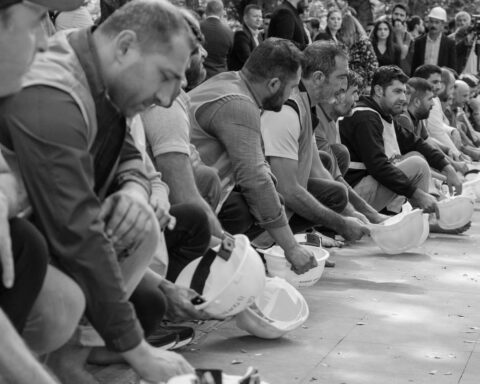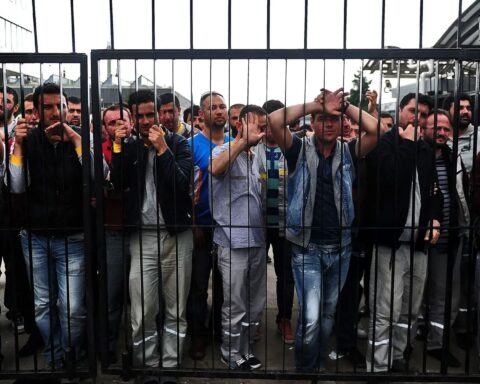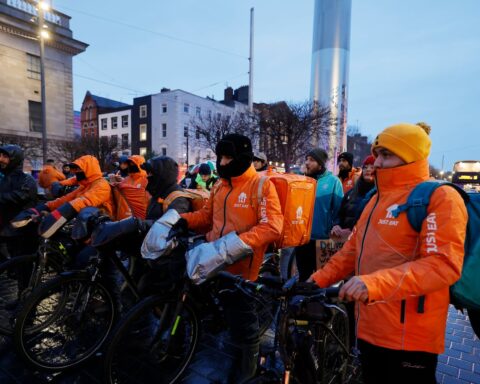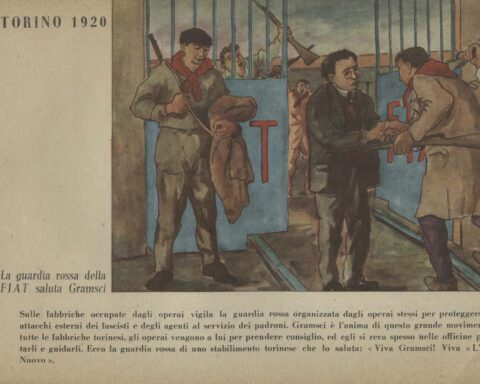The following is a revised translation of an article that originally appeared in the special issue ‘The University: Science, Education and Struggle’.
Free University London (FUL) was founded over a year ago, and is the product of shared misgivings and hopeful alternatives of our founders’ trying to navigate their way in the academy. With the conviction that another education is possible and necessary, we attempted to work against the domination of market-based metrics in higher education, prevalent in England as in many other places. Each one of us had experienced and observed processes of discrimination and exploitation in our educational and research duties. In addition to standing against injustices in this sector as union members, we wanted to show our peers and society at large that the situation does not need to be this way. Needless to say, however, the path ahead of us seemed arduous; from finding a location for classes and channels of communication with students, to the design of a platform from which to introduce ourselves and recruit volunteers to teach, and accomplishing all of this without a budget and a principled opposition to all kinds of fees.
Fortunately, we were not alone in this endeavour. Free University Brighton, founded in the nearby left-leaning coastal city, constituted a valuable example for us. One of our founders had been involved in founding and teaching with the institution and was in a position to bring this experience to FUL. In addition, we received heartening comments from those around us. Our colleagues and friends, who had been disappointed with academia after getting involved in it for similar reasons to ours, told us that they wanted to be involved in the project by preparing lessons in their fields. In a few weeks, original syllabi were created from a variety of disciplines. We organised an open day and introduced our teachers to interested students. This was an exciting start, and we had also managed to obtain space without charge at a social centre that espoused anarchist principles of mutual aid and self-organisation. Thus, following an introduction, FUL began with its first lesson on the philosophy of education, taught by one of our founders.

Since then, FUL has hosted many courses organised by volunteer instructors, with content ranging from literature to psycho-geography, contemporary poetry to the history of socialism. As the variety of courses and the duration of our activity increases, we find ourselves in a position where we can reach more potential students. That said, our founding principles take on an added significance as our scale as an alternative education institution grows and leads to a novel range of practical and theoretical considerations.
In this article, we will discuss the principles and goals of the FUL experience as an instance of the construction of an alternative academy, and the issues we have thus far encountered throughout our efforts to realise them, which, as will be seen, sheds practical light on such initiatives in general.
The corruption of education and the possibility of another academy
The first observation that brought us together as FUL was that education has become a privilege. In our own doctoral research and beyond that stage, this situation had put us at odds with the suffocating interventions of incompetent and unqualified management. This created unwelcome changes in our students’ expectations, as well as a homogenisation in the demographic and socioeconomic student profile. The intrusion of capital into public education is not a worrying development solely due to costs. The commercialisation of educational institutions begets students-as-customers, and undermines the form, content, and quality of university education. In light of our experiences, we decided to form an ‘anti-university’ of sorts, and discussed this ongoing process of commodification. In a way we set out on a search for an alternative education by ‘working backwards’.
British higher education could be described as a laboratory wherein the free-market policies of the (in)famous neoliberal leader Margaret Thatcher were deepened in the Tony Blair period. The first fees were introduced by the erstwhile Labour Party in 1998. This facilitated the degeneration of the public sector in terms of its attributes of relative autonomy from the market and universality. Though fees cost around £1,000 at first, they rose to £9,000 in 2010 with the decision of the liberal-conservative coalition government.[1] This decision was implemented at different degrees across the nations that make up Britain, taking deepest roots in England.
Rising costs of education were accompanied by a reduction in the wages of academic workers and a worsening in their working conditions. When one of us was working as a teaching assistant at the University of Birmingham, the ratio of stable to precarious, short-term employment like mine had increased to a staggering seventy percent. Considering the time commitment for the fulfilment of our responsibilities such as preparation and delivery of classes, accessibility and grading, our wages had fallen under the minimum wage. In the meantime, our vice chancellor could ignore our problems despite his £444,000 annual salary, and spend the revenue earned from students and our labour on unnecessary, ostentatious buildings and a new campus in Dubai.[2] Birmingham was not an exception, but rather the epitome of a continuing trend. Throughout our political and union struggles, we had many conversations with colleagues and friends from around the world, who had chosen academic careers to examine society through a critical lens and contribute to scientific advancement. These conversations often involved a shared observation that unhindered exploitation in academia sapped its creative vigour and created a situation of intellectual aridness.
Over the last decade, policies of this nature have become more widespread. They have also provoked waves of student resistance, which in turn faced heavy-handed state repression, as well as teaching strikes. The University and College Union, comprised of 120,000 members, decided to go on strike three times in highly publicised occasions.[3] Our search for an alternative education is also based on struggles to overcome the barriers put up by the state, waged by the students and youth. Free University Brighton, set up in 2019, and practices such as the Street Academy in Turkey – an initiative of expelled academics who taught courses and led workshops in their fields outside the campus on a voluntary basis – can be seen as guiding examples. Inspired by this repository of experience, our education model primarily aims to reject commercial relations and challenge the official channels via an alternative arrangement. Beyond a narrowly economic preference, this goal aims at the equalising impact of an education given and obtained on a voluntary basis. By unravelling the commodity status of the content we convey to students, we seek to weaken the short-term, instrumental logic tying education to employment or profit, and reproduce it as an end in itself, or an endeavour that adds meaning to life.
At the foundation of this effort is the ambition to struggle against what the famous pedagogue Paulo Freire termed the ‘banking model’ of education.[4] On this model, according to Freire, students are passive recipients of cognitive ‘capital’. This form of education not only hinges on crude memorisation, but also turns the content of the program into an ‘investment’, the teacher into an ‘investor’, and the student into an ‘object of investment’. Despite recent efforts to incorporate the students’ reactions and interventions into their education, and maintaining the banking analogies, the current ‘returns of investment’ for this approach appear to be low. An underlying cause of this is the relegation of the function of education to a conveyor belt that serves to fill sectoral gaps determined by capital. Critical and aesthetic considerations that fall outside this logic thereby cease to be the students’ primary concerns. As such, to use Freire’s terms, students are seen as ‘empty vessels’ while teachers become mechanical narrators, charged with the task of ‘filling’ them. These conditions reward the students for their propensity to be ‘filled’, impose a rigid hierarchy between students and teachers, therefore congealing and isolating the content of education from their lives. As Freire[5] words it:
The teacher talks about reality as if it were motionless, static, compartmentalized, and predictable. Or else he expounds on a topic completely alien to the existential experience of the students. His task is to ‘fill’ the students with the contents of his narration — contents which are detached from reality, disconnected from the totality that engendered them and could give them significance. Words are emptied of their concreteness and become a hollow, alienated, and alienating verbosity.
For example, the material provided on theorists in political science classes is transmitted in the form of ‘bite-sized’ points, to be repeated verbatim in assignments and exams, and thereby reduced to commodity status in the process. This situation hinders the student-teacher relationship and leads to tension and discord. The teacher often seeks to encourage students to leave aside worries about their grades and to provoke discussion based on independent scrutiny, while students, concerned with their future security and debt burden, understandably seek shortcuts to obtaining their degrees. At the same time, this pragmatic approach also becomes a mode of behaviour among academics, and puts those who resist conformity in a difficult position. Consequently, we can witness how experienced academics, who are otherwise known for their ‘oppositional’ stances, get ensconced in their positions, take short-sighted and self-interested positions, and tend to ignore the rights violations and raging class struggles in their own campuses.
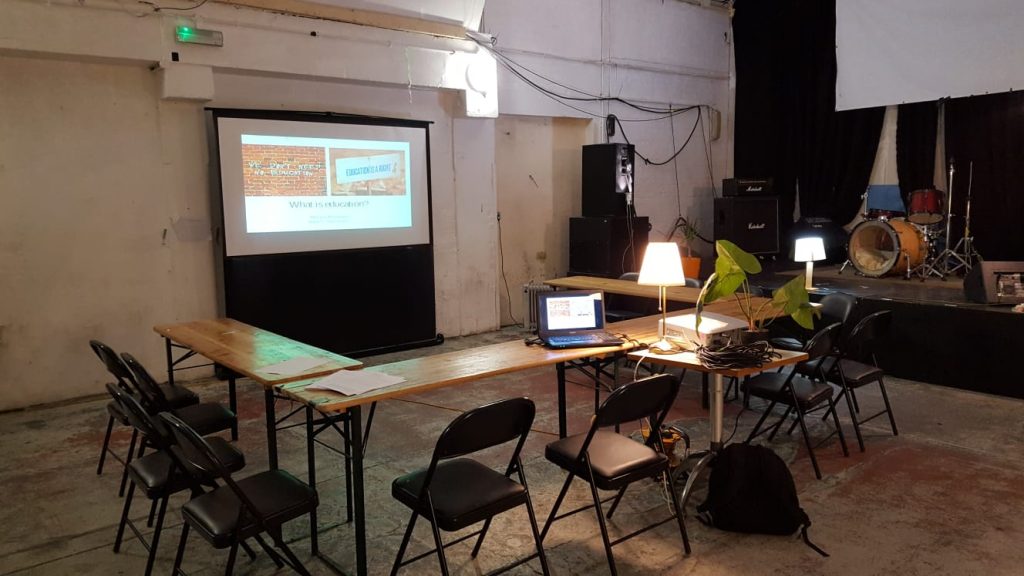
In contrast, the framework we wish to create is one where the content is delivered via a discussion that weighs its significance based on the echoes it can find in social life, and in an environment where the financial relations which negatively affect pedagogy are side-lined to the greatest extent possible.[6] In fact, the effect of money on education has been a regular theme scrutinised in class. In feedback from students, we have been told that the course content is not smothered in the discipline’s traditional terminology, and that our tutors’ approach also avoids belittling the students’ critical and intellectual capacities. We consider education as a search. We do not disregard what may be ‘found’ at the end of this search, but we aim to create education as a phenomenon whose ends are determined by the students as active agents. In this arrangement the student’s involvement is not limited to their feedback to the content delivered to them. Education conceptualised as a cooperative endeavour also entails the participation of students in areas traditionally reserved for the teacher, such as decisions on the material to cover; Each year we have an open call for subject areas and specific questions (such as Brexit, the future of Artificial Intelligence, or the nature of punishment) to be covered that year. These processes help to foster a collective learning environment, with the students’ own livelihoods and intellectual accumulation as constitutive features. As such, the role of the teacher is not limited to conveying and revising the material and correcting faulty comprehension; they are also a nodal point of a multilateral interaction, frank about their own subjective limitations and open to criticism. In addition, as FUL is the scaffold of an inclusive and egalitarian alternative, the teacher is expected not to take every possible input as self-evidently valid, and to question discriminatory and insensitive comments with the other students. This expectation stems from the recognition that a truly egalitarian education should include interventions in relation to the bigotry and oppression that take place in wider society.
The understanding of ‘subject-making’ which is at the core of this approach to education, aims to help us grasp the physical and social worlds as a unity of contradictions in movement, and aims towards a comprehension of our place within the chains of events that surround us, and thereby to equip us with agency over these processes. Epistemologically, this conception maintains that knowledge is accessible through an interaction between the subject and the object, and that knowledge should be extracted from within life itself. We believe that the principles we have set forth along these lines should be consistent with the infrastructural arrangements that will bring them to life. The above-mentioned professional inactivity and pragmatic degeneration reflects universities as nearly identical and sterile classes, amphitheatres and other facilities that are outside of time and space. It is predictable that academics, who have traversed these environments for many years, may be accustomed to this environment which creates an intimidating aura in the eyes of the students. However, these environmental factors should be taken into consideration when scrutinising the academy and its increasingly stark embodiment of class privilege. Assumptions whose ‘obviousness’ is taken for granted and thus rendered invisible, or what Pierre Bourdieu had termed the doxa, need to be within the purview of a critical academic practice precisely for this reason.[7]
Making the road by walking
As an independent organisation, thinkers such as Freire and Bourdieu provide us with enlightening insights. Even so, it is essential to resolve issues related to areas such as communication, logistics, and the division of labour through conversations between ourselves. In this way, we may reproduce the valuable ideas transmitted to us in a practice infused with theory, or through praxis. After all, Bourdieu and Freire’s works do not provide information on what needs to be done should you fail to find a projector in your first class. It is necessary to theoretically substantiate the attitudes we take regarding obstacles and forks in the road, and such conjunctural decisions can conversely rejuvenate theory where it falls short.
When we take a close look at the academy and ourselves through its mediation as, to borrow from Bourdieu once again, specimens of the homo academicus, the first reality that struck us was the exclusionary impact of the physical, discursive – and virtual – architecture.[8] In light of the consideration that the time and space we determine should be sensitive to this reality, we did not wish to organise our lessons in a university campus. Instead, we strove to find a location accessible to the people of London, in a way that does not create a contradiction between the form and content of the education we aimed to create. In doing so, our goal was to reach a student body that was diverse in terms of educational attainment and age, as well as race, class and gender; In other words, we hoped to have a demographic snapshot of the area.
Our first location was in a relatively low-income area, at a warehouse repurposed into a social centre. This centre provided facilities for education-based organisations like us, and contributed to community life with activities such as concerts and exhibitions. There were also workshops and technical courses that helped their participants with their livelihoods. We set up a class here and began delivering courses. One of these took up the psycho-geography of the city and encompassed walks in the area along with readings on its recent past. In this way we could synthesise the course content with the socio-cultural fabric of the borough and reach out to people at the centres of community life. As opposed to the cold, characterless academic surroundings that inculcate particular subcultural patterns of behaviour and discourse in ‘scientific’ garb, this learning environment facilitated students’ participation in a more at-ease fashion without disrupting the seriousness of the delivery. In the feedback we received, one student said that they appreciated this set-up though they were not immediately accustomed to it, while another stated that this was an arrangement where they could express themselves more candidly and felt more included in the decision-making processes.
Unfortunately, about three months after our initial lesson, we were informed that the social centre we used was on the brink of bankruptcy, and that the process would most likely culminate in eviction. Due to its unchecked, astronomical rent costs and problems of homelessness and inequality that burden its population, London is a prime exemplar of the neoliberal capitalist social experiment. For this reason, it was demoralising for everyone that this centre, having kept a door open for an alternative, co-operative order in the belly of the beast, as it were, was going to be closed.
At this point, we decided that in keeping with the needs of our students, the most appropriate course of action would be to find a new location. This was met with a serious protest among the community centre’s members: We were being accused of selfishness for not staying to help with finding a way out of the crisis. This unforeseen development compelled us to consider our place and responsibilities as an independent educational institution within the ‘ecology’ of horizontally organised initiatives autonomous from the state and the market. Owing to the primacy of our students, we did not change our initial decision to leave that centre. We judged the stability of our next newfound home to be of utmost importance, and one which was guaranteed. However, the ensuing arguments throughout the eviction process led us to realise that we could and should have been more attentive towards what was happening outside of our own activities, and responsible in the administration and day-to-day upkeep of the space. Ultimately, we conveyed these self-critical reflections to the centre with an institutional letter. Having drawn our own lessons from this experience, we were more frank and open about the nature of our cooperation at our subsequent location. We have thus come to firmly understand that carrying out our activities with like-minded organisations, in a culture of solidarity and with a manner of respect and honesty is more closely entwined with our goals, and these factors should always be taken into account.
While planning our first steps, we needed to devise the means that are conventionally provided in professional employment: not just the physical space, but also channels of communication such as an institutional e-mail address and an online platform. In this domain we relied on open-source software and made use of social media to introduce ourselves. We used donations to subscribe to a file-sharing and messaging platform, thereby establishing a standard of communication for instructors, who are otherwise allowed full autonomy in their delivery. At this stage we need to be cautious that no student is excluded from education as a result of this shift towards the virtual environment. With this in mind, we have provided an area in registration forms where students are allowed to disclose whether these changes affect their capacity to participate in courses, and if so, how we may be of assistance. Despite everything, we are not considered an ‘educational institution’ by the virtual communication company Zoom, and could not benefit from the limitless call feature provided to these institutions free of charge. Having evaded institutionalisation beyond a particular level presented an obstacle. Rather than being merely incidental problems, such mishaps reveal deeper considerations regarding our guiding principles. Our legal profile determines our access to certain possibilities, and these in turn entail a number of responsibilities vis-a-vis local governments and the state.
There are hurdles which we could easily clear by taking particular steps. One of these is the donation campaign we have recently begun. Following the example of Free University Brighton, we have been accepting donations over the last few months. We intend to use these donations to fund the online platform that has gained more importance with the ongoing pandemic and produce physical promotional material. With these goals in mind, we have opened an institutional bank account and gained charity status. In England, the donations obtained as a charity are used for charitable purposes and hence exempt from taxation, and we maintain a transparency across procedural records. This gives us a relatively ‘legitimate’ standing and puts us in a position to extend our reach.
As our institutionalisation progresses we are occasionally asked whether we provide a certificate at the end of each course. It appears that a ‘benefit’ of austerity, increased living expenses and above all the state’s dereliction of its duty to provide free and good-quality education, has been an increased demand for independent organisations to provide basic education. Ironically, institutions that value their independence from the state are left to compensate for the staggering void that the state has left behind. Regardless, we do not believe that reinforcing the basic subjects such as practical language courses or bike mechanics would entirely overlap with the objectives we have set for ourselves, and indeed there are numerous groups across London offering these skills. As we gain more developed means, we may follow Free University Brighton’s example and include the provision of ‘Free-gree’ certificates. Our priorities for the moment are the needs of the participants who carve out the time from their family, work and other responsibilities to enrol in the university-level education they have not had the opportunity to obtain, and to pursue education as an end in itself. We can see in the feedback we have so far received that our effort to ‘socialise’ science and knowledge in the sense of turning them into the objects of a collective effort has been met with appreciation.
We have had to move our courses online due to the pandemic, and the questions of who will learn – and teach – with us, and how they will do this, have gained a new significance. In my last course, most participants had connected from London, but some also joined from other countries. One of our tutors connected from abroad to teach. Certainly, surpassing national boundaries and reaching a global crowd has its advantages. This situation nevertheless raises a problem regarding the principle of accessibility and emphasis on the local. We have not yet achieved the demographic diversity that we aim for, particularly in terms of education. Despite the fact that there are no educational prerequisites, around half of our students hold undergraduate or graduate degrees. This could be explained by the fact that we are still at the beginning, and with reference to certain factors that relate to cultural capital and need to be considered in more detail. We advertise via social media, and the online realm privileges the voice of the middle class, which in turn tends to be composed of relatively young, educated and white-collar people, and therefore the persistence and deepening of this slanted distribution in this realm is a potential threat that cannot be overlooked. Occasional contact with existing community groups is the exception rather than the rule and housing or tenants groups are rarely interested in collaboration. Moreover, already-overworked local charities do not have the means to begin new partnerships. Additionally, even though online lessons facilitate the participation of people with disabilities in some ways, joining Zoom meetings -a strange and novel experience for most of us- can create a sense of apprehension and anxiety among some otherwise motivated students. In the following months, we are required to deliberate on ways to make it possible for students to communicate their needs to us and jointly consider sensible solutions.
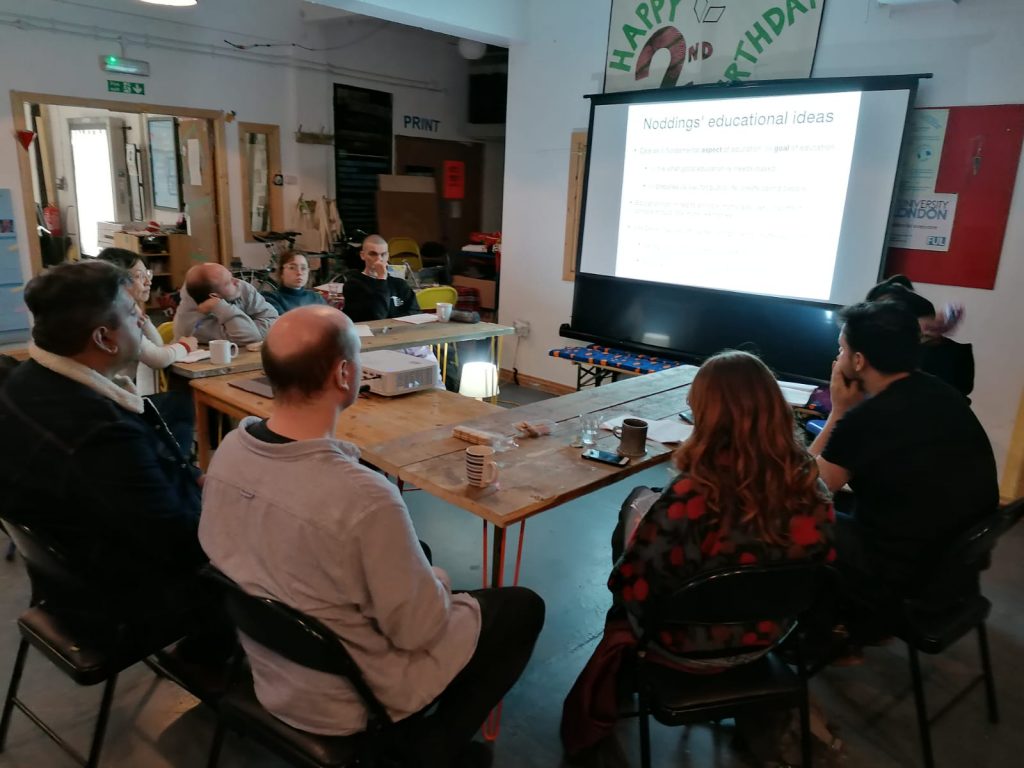
FUL forges ahead as an initiative for alternative education with the efforts of its students and tutors, building on past experience and regular self-reflection. As relentless exploitation and lifeless syllabi take root due to neoliberal approaches to higher education, we are faced with the task not just of struggling against these approaches in the intellectual and political realms, but also of weaving together practical alternatives at the base. We have been experiencing the multifaceted processes of institutionalisation and forks in the road detailed here, under the shadows of endless waves of marketisation and the ascendant right’s marginalisation of critical academics. We strive to set our sails in accordance with the principles and goals that have initially motivated us to advance into this maelstrom. In this period, in which the ruling classes’ endeavours to maintain its hegemony with increasingly stark rage and repression, it would not be difficult to surmise that access to good-quality, free and scientific education will be further limited. Even so, FUL and other similar initiatives demonstrate that regardless of elections results and makeup of governments, we can create the building blocks of the new society with our own accumulation, resources and ambitions in the here and now. Following alternatives that maintain sparks of possibility for a different education and academy, instead of getting fatigued in the midst of these conditions exacerbated by the pandemic, has a special significance in these days.
In lieu of conclusion: Re-socialising the academy
As commodification pervades all aspects of our lives from natural resources to healthcare and to political office, it would be amiss to expect that universities, which should be administered by and for the public, would not receive its share of this process. As other articles in this issue also explain, this results in the formation of an order that can be summarised as granting diplomas and certificates for money. As contracts get shorter and wages are reduced, even our most ambitious friends and colleagues in the field are obstructed from attaining the means required to fulfil their goals of holding power accountable, pursuing the truth regardless of the interests it may jeopardise, and defending ideas that threaten the system.
Primarily with their sheer presence, FUL and organisations with a similar orientation reveal that despite all odds, people are driven to make time to pursue knowledge and science for their inherent values, and that it is wrong to commercialise institutions which hope to foster these efforts. Resistance can be sensed, however, in the proliferation of academies standing as alternatives to the direct and indirect restructuration of nominally public institutions according to market conditions. Though it is inappropriate -and unnecessary- to expect these organisations to replace academia altogether, we believe that they form focal points committed to the real objectives of its existence. It can be argued that alternative academies, whose distinct working principles, advantages and problems we have touched upon throughout this article, will take on more importance over time and with further experimental developments. In these dark times we are in, as public’s resources are used to the public’s detriment, we hope the above account will serve as a modest experiential record which might aid new initiatives.
Malcolm Macqueen is a Doctoral researcher at the University of Warwick and co-founder of Free University London.
[1] Under the Tony Blair administration, the commodification of higher education went so far that in 2003, the Conservative opposition would propose to scrap the fees and position itself to the ‘left’ of the Labour Party.
[2] Sir David Eastwood, the vice chancellor of Birmingham University, has gained notoriety for his market-oriented policies. The President Lord Karan Bilimoria is known for his commercial activities rather than academic achievements; he has made the headlines in recent years due to his name coming up in the Panama Papers, the leak which revealed widespread corruption among the global financial and political elite. For the statements of the University and College Union on these respective figures, see here and here.
[3] Detailed information on the strikes can be found on their Wikipedia page.
[4] Freire, P. [1970] 2005. The Pedagogy of the Oppressed. London: Continuum, p. 71-86.
[5] Freire, P. [1970] 2005. The Pedagogy of the Oppressed. London: Continuum, p. 72.
[6] Considering the fact that students still need to cover costs such as transportation, childcare, and related needs, we do not claim to provide an education that is entirely free.
[7] Bourdieu, P. 1977. Outline of a Theory of Practice. Cambridge: Cambridge University Press.
[8] Bourdieu, P. 1990. Homo Academicus. Cambridge: Polity Press.


